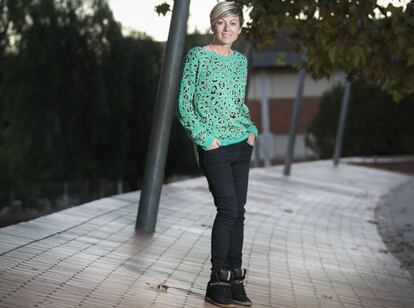“It’s sad. They’ve said to my face: ‘You’re doping,’ but I’m clean”
Spain's only female Olympic track & field medalist, María Vasco, retires from racewalking


It's only now, at the age of 37, that María Vasco — the only female Spanish track & field athlete to have stood on an Olympic podium — has started running. After 27 years devoted to racewalking, the bronze medalist in the 20km walk at the 2000 Sydney Games has decided to retire and now wants to run a marathon -- probably New York next year. She's also bought a bicycle with the idea of taking up the duathlon.
Question. How have the first days of your retirement been?
Answer. It's difficult to take in. Until now I thought I wasn't sufficiently recognized. Sometimes athletes are forgotten a bit, and even more so in the case of walking. They are only talked about when the big events come up. It's even difficult to value an Olympic medal. Occasionally my partner [triathlete Javier Lorente] and my friends tell me: "You ought to value a bit more what you have achieved." I consider myself a humble person; I don't go through life saying I have made history, that I am the only Spanish female athlete who has obtained an Olympic medal.
Q. Do you see a new generation coming through?
A. We are looking at a group of athletes who have to mature. You need to give them time; they will get there. Perhaps a link has been lost; there is a lot of difference between those of us who are going and those coming behind. But to be in the elite you have to work 100 percent and, with the little that we receive, it's difficult. I have been flat out for 20 years. The walk requires you to train twice a day, morning and evening -- there's no other way.
Q. After winning your medal in Sydney you said: "If I have a child, I will tell them not to devote themselves to this." Is that still true?
I am clean. I have known what it's like to be in first place, in fifth and 10th"
A. I train a nine-year-old girl and I love it. I get the feeling that it's me as a little girl. It's natural for her. That statement was said on the spur of the moment. I'm not going to say to her "don't do the walk," even though if I can put a racket in her hand, I am going to do so. But the essential thing is always to do sport, because it gives you values that you won't find in the street or in many other places.
Q. Have you reached your limits?
A. The person I've always been most scared of is myself. I have distinguished myself as a result of an enormous amount of suffering. And, yes, I have reached the limit because I have competed not at 100 percent, but at 200 percent. Sometimes I've thought: "I wonder if I'm going to end up on the tarmac." I had a terrible time at the Mediterranean Games in Almería. We were dehydrated and we got to the finish line doing zigzags. I finished second. After I got up on the podium, I fainted.
Q. Some, or many, people in this situation have resorted to doping.
A. It's sad. [...] Like many people, I have been disappointed by a lot of athletes on this subject. There have been so many shocks that some people have started saying to my face: "You're doping." But no. I am clean. I have known what it's like to be in first place, in fifth and in 10th. It's very difficult to always be in the medals, but I have persisted. I have always been against doping. It annoys you to know you have been competing against people who doped. My conscience is clear.
Q. But everyone ends up tarnished.
A. In the end they put us all in the same bag. I think that anyone who tests positive has to be suspended for life. Two years is nothing. Still learning their lessons, they continue. It is a shame, they are besmirching the whole of Spanish sport.
Tu suscripción se está usando en otro dispositivo
¿Quieres añadir otro usuario a tu suscripción?
Si continúas leyendo en este dispositivo, no se podrá leer en el otro.
FlechaTu suscripción se está usando en otro dispositivo y solo puedes acceder a EL PAÍS desde un dispositivo a la vez.
Si quieres compartir tu cuenta, cambia tu suscripción a la modalidad Premium, así podrás añadir otro usuario. Cada uno accederá con su propia cuenta de email, lo que os permitirá personalizar vuestra experiencia en EL PAÍS.
¿Tienes una suscripción de empresa? Accede aquí para contratar más cuentas.
En el caso de no saber quién está usando tu cuenta, te recomendamos cambiar tu contraseña aquí.
Si decides continuar compartiendo tu cuenta, este mensaje se mostrará en tu dispositivo y en el de la otra persona que está usando tu cuenta de forma indefinida, afectando a tu experiencia de lectura. Puedes consultar aquí los términos y condiciones de la suscripción digital.








































